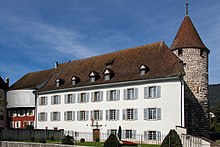Parliament (Jura)
The Jurassic Parliament ( French Parlement jurassien ) is the parliament of the canton of Jura . The seat of parliament is the Hôtel du Parlement in Delémont . Since 2010, its 60 members have been elected for five years in three constituencies using proportional representation. The last general renewal election took place on October 18, 2015 at the same time as the national elections . The next election will take place on October 18, 2020.
tasks
The tasks and composition of the parliament are regulated in Articles 82 to 88 of the Constitution of the Canton of Jura. Accordingly, it is the supreme legislative authority, subject to popular rights, and the supreme supervisory body over the government, administration and the judiciary.
Parliament draws up constitutional provisions in the event of a constitutional amendment and passes laws and ordinances, which require two consultations (Art. 83). Its further powers are regulated in Art. 84.
Parties
In the elections to the Jura parliament, the following allocation of seats resulted:

Members
eligibility
According to the electoral law ( Loi sur les droits politiques ) every Swiss citizen aged 18 and over who has not been incapacitated can be elected (Art. 6). MEPs can be re-elected twice in a row at most (Art. 29a). Candidates must be domiciled in the relevant constituency (Art. 34). Foreigners cannot be elected, but have the right to vote if they have been living in Switzerland for six years and in the canton of Jura for one year (Art. 3).
Number and distribution among the constituencies
According to the canton's constitution (Art. 85), the parliament has 60 members ( députés ). Each district forms an electoral district and automatically provides three members, the remaining 51 members are allocated in proportion to the population (Art. 86).
The number of MPs per constituency for the 2020 election was determined based on the population as of December 31, 2018:
| district | population | Number of representatives |
|---|---|---|
| Delémont | 38,590 | 30th |
| Freiberg | 10,389 | 10 |
| Pruntrut | 24'440 | 20th |
Election process and allocation of seats
In the canton of Jura, voting is based on proportional representation. Since the distribution of seats is based on the constituency result ( Hagenbach-Bischoff procedure ), the cantonal result does not play a direct role. There is no explicit threshold , but the natural threshold is up to 10% (Freiberg district). List connections are not allowed.
Each voter has as many votes as there are mandates to be given in the constituency (Art. 38 Loi sur les droits politiques ). There is the possibility of accumulation , but a candidate can be given a maximum of two votes. Candidates can also be deleted from one list and replaced by other candidates from another list ( variegation ). A free list can also be compiled as desired.
In the election, substitutes ( suppléants ) are elected, who can represent MPs from the same parliamentary group and, if they resign , move up as MPs . The number of candidates elected as substitutes per list (maximum four) depends on the number of elected representatives. The non-elected representatives with the highest number of votes are elected (Art. 44, 47 ff.).
See also
Web links
- List of MPs (French)
Individual evidence
- ^ Constitution de la République et Canton du Jura. Retrieved June 26, 2020 (French).
- ↑ a b Canton of Jura: national and cantonal elections since 1979. Federal Statistical Office , February 20, 2020, accessed on July 7, 2020 .
- ↑ Aide-mémoire concernant le deroulement des élection cantonales 2020. Retrieved on July 5, 2020 (French).
